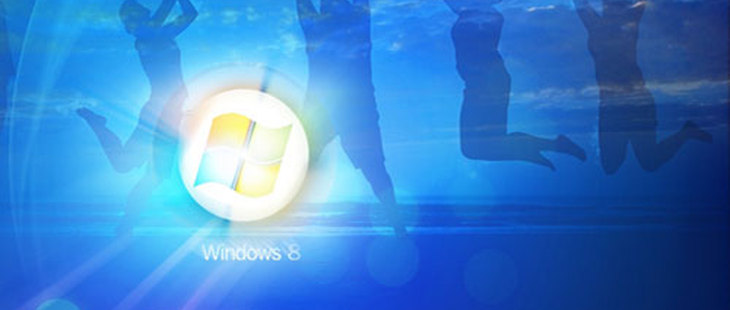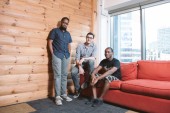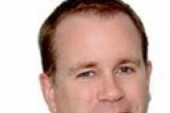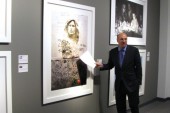
If you might allow me to indulge in some mild exaggeration, Windows 8 represents not only a computing leapfrog over Apple, but also the future of everything. But maybe I should back up a bit. Earlier this week, Microsoft demoed the next iteration of their ubiquitous Windows operating system. Unlike most of the Redmond company’s creations, however, the reaction to Windows 8 was almost universally positive. Though still in an early state, the tech world heaped praise on the beautiful look, its innovative tweaks and, maybe most importantly, that the operating system runs on all sorts of computers. See, on the surface Windows 8 sports a very snazzy tile-based interface that, not coincidentally, is perfect for tablets. In fact, that’s how it was presented. But lingering underneath that slick aesthetic–that Gizmodo says “goes beyond what Apple has done by quite a bit”–is a refined, more elegant version of the already great Windows 7. It is, according to Microsoft, the best of both worlds: the ease of a touch-based tablet UI, combined with the robust, workmanlike focus that lead to things like Excel and Word. It’s the kind of hybrid approach that people like Apple ber-fan (and Freudian fodder) John Gruber say could and will never work. He argues Apple’s approach, in which tablets and phones have their own operating systems, is necessary because mobile devices and PCs are totally different things. Though the latest version of OS X moved closer to mobile OS’es, to Apple the ‘post-PC era’ that we’ve heard so much about is that we mostly do away with clunky, inelegant PCs and all buy and use iPads which, presumably, we all use while riding unicorns. Microsoft have taken a different tack–and it’s arguably a lot smarter. Rather than forcing users to choose between the machine they use to do spreadsheets and the one they surf the net with, they’ve designed an OS that does both, using a touch-based interface when necessary and a mouse and keyboard for those finicky tasks that require more than a fingertip. They’ve even made it so that when you shut down one computer and then log into another, all your settings and even where were you were in a document load up right away. To Microsoft, then, it’s not that post-PC meant the end of the personal computer at all. It’s that the idea of a computer as either a fixed, stable thing that sits on your desk at home or your lap–or in your hands as tablet or phone–is much less important than the computer becoming a virtual notion, constantly in flux. A tablet computer can be held in your hands to check the news, but then be propped up, connected to a mouse and keyboard and then be used to type out a long document. It’s computing as an thing you do, not a thing you hold. But if for some inexplicable reason you wanted to get a bit more philosophical about this, Windows 8 is yet another shift in our relationship to objects. See, if the operating system–the thing through which you access all your data–is adaptable and most of your stuff exists online rather than on the computer itself, then what exactly is your PC? At what point does a tablet PC become a desktop PC? When you plug in a keyboard, or when you simply use it for work? If all of your files are in the cloud, then where is ‘your work’–on a server in California, the thing in front of you or somewhere in between? ‘Your’ computer becomes a lot less important than your stuff, which doesn’t really exist at any one place. These aren’t just abstract, weird ideas. Okay fine, you’re right, they totally are. But they’e also a reflection of the fact that because virtual things are arguably more ongoing processes than objects–things in flux, rather than static, unchanging things–as we start to rely more on software than hardware to determine our relationship to both information and stuff, the idea of where one object ends and another begins gets all kinds of messy. Which, historically, isn’t exactly an isolated thing; it’s happening all around us. Is an eBook still a book if it also contains links and pictures? What about if the author updates it and those changes get synced to your Kindle automatically? Is the album still an album if a new track gets added every week? And most importantly: When Star Wars is released as an online digital copy and Lucas tweaks it every other week, at what point will it no longer be Star Wars: when 15 percent of the scenes are changed? 25 percent? What exactly is a digital object or work, and when does it stop being one thing and start being another? The point is that as our lives fill up with digital, virtual objects, old ideas about the unique function of physical things starts to change. And in building an amorphous operating system that takes precedence over the hardware it works on–all your stuff on a tablet now, a phone tomorrow and a PC next week–Microsoft seemed to have looked over a horizon Apple are still stuck on, a fact that is actually much less surprising than it sounds. After all, Apple is still at its core a hardware company–one that made over $7 billion in profit in the last quarter by selling us objects. So, sure, maybe saying Windows 8 is ‘the future of everything’ is something of an exaggeration. But if it is, it’s only by a little bit.














